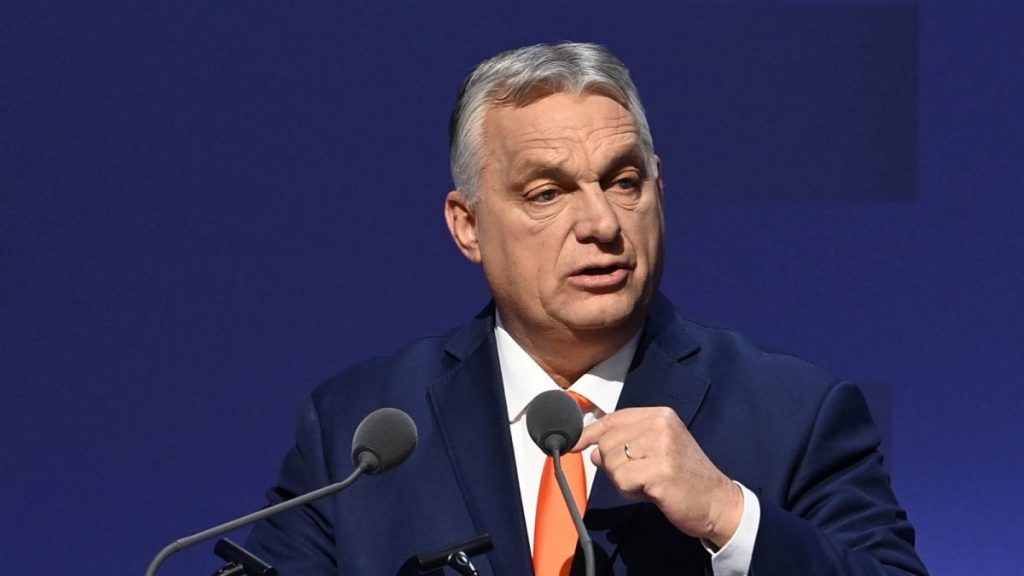Viktor Orbán, the Hungarian Prime Minister, delivered a scathing critique of the European Union’s leadership and direction during a conference in Budapest. He argued that the EU has become isolated on the global stage, alienated from key players like the United States, Russia, China, and Africa. He attributed this isolation to the policies and direction pursued by the EU leadership, predicting a bleak future for the bloc if its course remains unaltered. Orbán contrasted the EU’s perceived decline with what he saw as a burgeoning alliance between the newly elected US President Donald Trump and a rising right-wing faction within the European Parliament, the Patriots for Europe. He expressed hope that this coalition would usher in a “reconstruction of the Western world,” suggesting a significant shift in the global political landscape.
Orbán’s speech was marked by a strong sense of national pride and a deep distrust of the EU’s centralized bureaucracy. Reflecting on Hungary’s recent EU presidency, he accused Brussels of pursuing a path of integration for integration’s sake, building a bureaucratic apparatus that overrides the sovereignty of individual nation-states. He portrayed Hungary as a champion of national sovereignty, resisting the encroachment of Brussels and offering an alternative model of governance. He highlighted Hungary’s economic performance, its distinct national identity, and its independent approach to international relations as evidence of a successful experiment in defying the EU’s prescribed path. He further claimed that the EU’s current trajectory would lead to its becoming a “loser” in the emerging world order.
Central to Orbán’s critique was the accusation that the EU suffers from a multitude of ailments: an inability to guarantee peace and security within Europe and its surrounding regions, a failure to manage illegal immigration effectively, a lack of vision for the agricultural sector, and a dangerous inclination towards expanding its membership, specifically citing the potential inclusion of Ukraine as detrimental to European farmers. He argued that these failures were compounded by the ever-growing power and influence of the Brussels bureaucracy, which he characterized as being out of touch with the realities faced by individual member states.
He further contended that the “bureaucrats in Brussels” are impervious to reason and persuasion, clinging to their vision of an ever-more integrated Europe regardless of the negative consequences. He framed the struggle as one between the sovereigntist nations and a federalist, bureaucratic elite in Brussels, accusing the latter of being driven by a left-liberal, trans-Atlantic agenda that seeks to undermine national identities and autonomy. Orbán positioned Hungary as a leading opponent of this “Brussels system,” advocating for a return to a Europe based on the principle of national sovereignty.
Adding a personal dimension to his attack, Orbán accused George Soros, the Hungarian-born American financier and philanthropist, of orchestrating a “united liberal front” designed to attack patriots and sovereigntists. He claimed that Soros and his allies employ a range of tactics, from offering inducements like prestigious positions and financial rewards to resorting to threats of fines and sanctions, in their efforts to silence those who challenge their vision for Europe. He specifically mentioned the insistence on applying the rule of law and fighting corruption within Brussels itself as a trigger for these attacks.
In summary, Orbán’s speech painted a picture of a deeply divided Europe, with Hungary positioned as a defiant nation-state resisting the encroachment of a centralized and increasingly powerful Brussels bureaucracy. He expressed admiration for the incoming US President Trump, suggesting a potential alliance between like-minded leaders who prioritize national interests over supranational institutions. He cast Hungary as a pioneering model for other nations seeking to reclaim their sovereignty and chart their own course, independent of the EU’s dictates. His critique was interwoven with warnings of the EU’s decline and predictions of a new world order where national identity and sovereign power would regain prominence.

